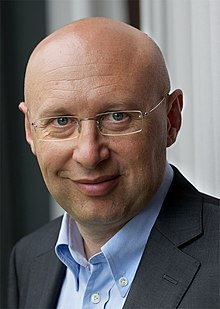Stefan Hell
| Stefan Walter Hell | |
|---|---|

Stefan W. Hell
|
|
| Born |
23 December 1962 Arad, Romania |
| Citizenship | German |
| Fields | Physical chemistry |
| Institutions |
European Molecular Biology Laboratory Max Planck Institute for Biophysical Chemistry German Cancer Research Center |
| Alma mater | Heidelberg University |
| Thesis | (1990) |
| Known for | STED microscopy |
| Notable awards |
Nobel Prize in Chemistry (2014) Kavli Prize in Nanoscience (2014) Otto Hahn Prize (2009) Gottfried Wilhelm Leibniz Prize (2008) |
Stefan Walter Hell (born 23 December 1962) is a Romanian-born German physicist and one of the directors of the Max Planck Institute for Biophysical Chemistry in Göttingen, Germany. He received the Nobel Prize in Chemistry in 2014 "for the development of super-resolved fluorescence microscopy", together with Eric Betzig and William Moerner.
Born into a Banat Swabian family in Arad, Romania, he grew up at his parents' home in nearby Sântana. Hell attended primary school there between 1969 and 1977. Subsequently, he attended one year of secondary education at the Nikolaus Lenau High School in Timișoara before leaving with his parents to West Germany in 1978. His father was an engineer and his mother a teacher; the family settled in Ludwigshafen after emigrating.
Hell began his studies at the Heidelberg University in 1981, where he received his doctorate in physics in 1990. His thesis advisor was the solid-state physicist Siegfried Hunklinger. The title of the thesis was “Imaging of transparent microstructures in a confocal microscope”. He was an independent inventor for a short period thereafter working on improving depth (axial) resolution in confocal microscopy, which became later known as the 4Pi microscope. Resolution is the possibility to separate two similar objects in close proximity and is therefore the most important property of a microscope.
...
Wikipedia
